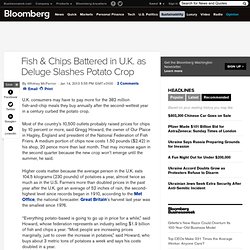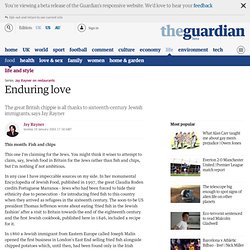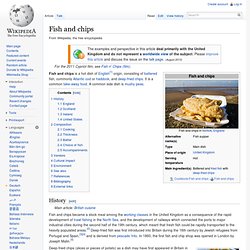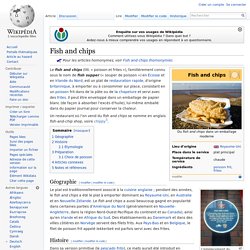

What Is Panko? (with picture) Fish & Chips Battered in U.K. as Deluge Slashes Potato Crop. U.K. consumers may have to pay more for the 382 million fish-and-chip meals they buy annually after the second-wettest year in a century curbed the potato crop.

Most of the country’s 10,500 outlets probably raised prices for chips by 10 percent or more, said Gregg Howard, the owner of Our Plaice in Hagley, England and president of the National Federation of Fish Friers. A medium portion of chips now costs 1.50 pounds ($2.42) in his shop, 20 pence more than last month. That may increase again in the second quarter because the new crop won’t emerge until the summer, he said. Higher costs matter because the average person in the U.K. eats 104.5 kilograms (230 pounds) of potatoes a year, almost twice as much as in the U.S. Farmers more than doubled prices in the past year after the U.K. got an average of 52 inches of rain, the second-highest level since records began in 1910, according to the Met Office, the national forecaster. Close Open Photographer: Chris Ratcliffe/Bloomberg Early Varieties.
Cost of Living- Fish and Chips. Fish and chips still remains the favorite take away meal in the UK despite fierce competition.

The exact origins are unknown but it has been established that chips arrived from France during the 18th Century. There was also mention of fried fish and bread in ‘Oliver Twist’ by Dickens, published in the 1830s. Enduring love. This month: Fish and chips This one I'm claiming for the Jews.

You might think it wiser to attempt to claim, say, Jewish food in Britain for the Jews rather than fish and chips, but I'm nothing if not ambitious. In any case I have impeccable sources on my side. In her monumental Encyclopedia of Jewish Food, published in 1997, the great Claudia Roden credits Portuguese Marranos - Jews who had been forced to hide their ethnicity due to persecution - for introducing fried fish to this country when they arrived as refugees in the sixteenth century. The soon-to-be US president Thomas Jefferson wrote about eating 'fried fish in the Jewish fashion' after a visit to Britain towards the end of the eighteenth century and the first Jewish cookbook, published here in 1846, included a recipe for it. Well there was one person,' she says, 'but they didn't have an alternative suggestion. But it was the mighty industrial revolution that really fostered the business. The result was growth. Le fish and chips version Ducasse.
Fish and chips. History[edit] Fish and chips became a stock meal among the working classes in the United Kingdom as a consequence of the rapid development of trawl fishing in the North Sea, and the development of railways which connected the ports to major industrial cities during the second half of the 19th century, which meant that fresh fish could be rapidly transported to the heavily populated areas.[2] Deep-fried fish was first introduced into Britain during the 16th century by Jewish refugees from Portugal and Spain,[3][4] and is derived from pescado frito.

Fish and chips. Un article de Wikipédia, l'encyclopédie libre.

Le fish and chips (litt. « poisson et frites »), familièrement connu sous le nom de fish supper (« souper de poisson ») en Écosse et en Irlande du Nord, est un plat de restauration rapide, d’origine britannique, à emporter ou à consommer sur place, consistant en un poisson frit dans de la pâte ou de la chapelure et servi avec des frites. Il peut être enveloppé dans un emballage de papier blanc (de façon à absorber l’excès d'huile), lui-même emballé dans du papier journal pour conserver la chaleur. Un restaurant où l'on vend du fish and chips se nomme en anglais fish-and-chip shop, voire chippy[1]. Géographie[modifier | modifier le code] Histoire[modifier | modifier le code] Dans sa version primitive (le pescado frito), ce mets aurait été introduit en Angleterre aux XVIIe et XVIIIe siècles par les Juifs séfarades du Portugal[2],[3].
Étymologie[modifier | modifier le code]